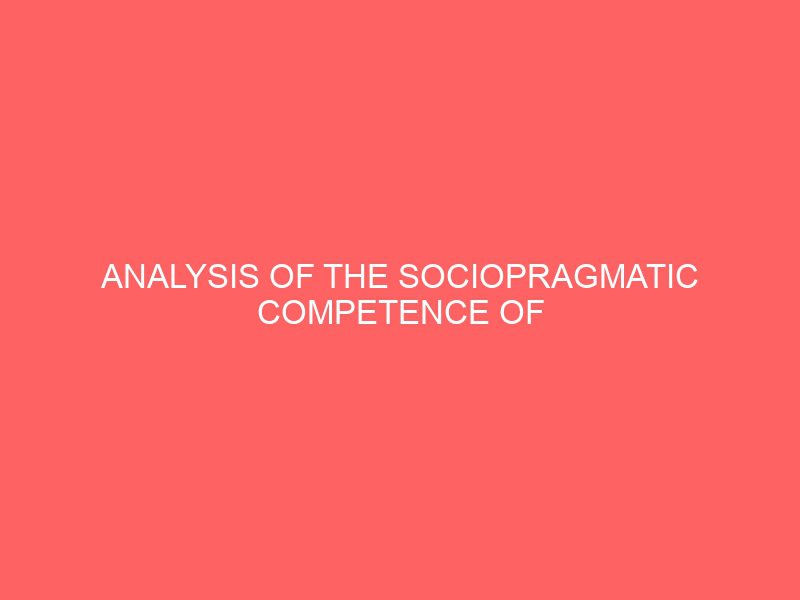Description
ABSTRACT
Acquiring sociolinguistic competence in another language is a slow and difficult process, since it involves understanding the culture and social values of that underlies the community’s way of using language. Many rules for polite interaction depend on an understanding of the social distance norms of the community. Despite the domestication of English and the view of communicative competence from Nigerian sociocultural perspective, the ESL undergraduates exhibit sociopragmatic inadequacies in the use of the English as a means of communication. The purpose of this work is to find out how sociopragmatic competence improves communicative competence in English in a second language situation. This study explores the sociopragmatic theory of language use since it claims that language in use is governed by and can be interpreted by sociocultural norms and values of a speech community. Hence, the following social variables were manipulated: social distance, power distance, setting and politeness strategy. This investigation was carried through a DCT Discourse Completion Test on request expressions which was used as a pilot study and MCDCT Multi choice Discourse Completion Test on apology expressions. Apology and request expressions are two expressive speech acts which are culturespecific. Blumkulka and Olshtain study on English culture served as a model for this enquiry. These tests were administered to sixty 60 first year students who were randomly selected from three universities in Anambra State. A general questionnaire was given to lecturers from the select institutions based on the research questions. The data collected were analyzed using the sociopragmatic theory of language use. The results of the finding reveals that some lecturers are not familiar with the term, sociopragmatics and ESL learners are not adequately exposed to the L2 sociopragmatics. This, to a large extent, affects their social use of English. This work proffered workable strategies to be adopted to promote sociopragmatic competence in English since it is a prerequisite for appropriacy, politeness, mutual understanding and communicative competence.
Table of Contents
Title Page i
Approval Page ii
Certification iii
Acknowledgments iv
Dedication v
Abstract vi
Table of Contents vii
Chapter One: Introduction
1.1 Background to the Study 1
1.2 Statement of the Problem 11
1.3 Purpose of the Study 11
1.4 Scope of the Study 12
1.5 Significance of the Study 13
1.6 Research Questions 14
1.7 Definition of Terms 15
Chapter Two: Review of Relevant Scholarship
2.1 Conceptual Framework 17
2.1.1 Language and Communication 19
2.1.2 Language and Culture 20
2.1.3 Language Use in Nigerian Multilingual Environment 26
2.1.4 Linguistic and Communicative Competence: An Overview 27
2.1.5 An Overview of the Concepts of Pragmatics and SocioPragmatics 31
2.1.6 Speech Acts 37
2.1.7 The Relationship between SocioPragmatics and Communicative Competence 48
2.1.8 Factors Affecting SocioPragmatic Competence in ESL Situation 49
2.1.9 Strategies for Developing SocioPragmatic Competence in ESL 62
2.2 Theoretical Framework 70
2.3 Empirical Studies 73
Chapter Three: Methodology
3.1 Research Design 78
3.2 Population 78
3.3 Sample and Sampling Technique 78
3.4 Method of Data Collection 79
3.5 Tests for Reliability and Validity of Research Instruments 79
3.6 Method of Data Analysis 80
Chapter Four: Data Analysis
4.1 Research Question One 93
4.2 Research Question Two 94
4.3 Research Question Three 96
4.4 Research Question Four 97
Chapter Five: Discussion of Results, Recommendations and Conclusions
5.1 Discussion of Results 98
5.2 Conclusion 100
5.3 Recommendation 101
5.4 Suggestions for Further Studies 102
Work Cited 103
Appendix I 115
Appendix II 116
Appendix III 117
Appendix IV 121
Appendix V 125
Appendix VI 130








Reviews
There are no reviews yet.